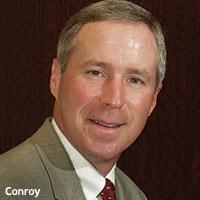 Americans have turned into grocery-store Ninjas, and new research from Deloitte shows that in a typical shopping cart, fully 7 out of 10 of their items are
discounted. But as consumers continue to intensify certain types of deal-seeking behaviors, such as having precise price limits for certain brands and items, they’re losing interest in others,
including private labels. Pat Conroy, vice chairman, Deloitte LLP and consumer products sector leader, puts it into perspective for Marketing Daily.
Americans have turned into grocery-store Ninjas, and new research from Deloitte shows that in a typical shopping cart, fully 7 out of 10 of their items are
discounted. But as consumers continue to intensify certain types of deal-seeking behaviors, such as having precise price limits for certain brands and items, they’re losing interest in others,
including private labels. Pat Conroy, vice chairman, Deloitte LLP and consumer products sector leader, puts it into perspective for Marketing Daily.
Q: Consumers backing off
private labels is big news: Your new research finds that 49% say they are no longer interested in store brands. What gives?
A: When the recession started in 2008,
people looked for many ways to cut costs. Even last year, they were still going through this process of discovery, saying 'I’m trying new products and not having bad experiences.’ They
enjoyed experimenting, and liked the money they were saving. And they felt those brands were as good or better than name brands.
advertisement
advertisement
Now they know what they like. Nine in 10 say they have already
figured out which store brands and private labels work for their families, and which ones don’t.
Q: So what are they experimenting with now?
A:
They’re through experimenting. Last year, they were still writing lists in pencil. Now, it’s in ink. And since they know what works, they can focus on what is most important to them, which
is time. Shoppers are trying to become more efficient. Yes, they want to be frugal, and they’ve gotten very good at that. Now they want to recapture some lost time. That was a main driver before
the recession, and they are returning to that.
Q: So they are less focused on price?
A: In some ways. They’re saving money by knowing
exactly what they want before they walk into a store. They do expect deals. But the presence of deals in the store seems to be more important than the depth of the discount.
Q: What
are they focused on?
A: Sport. They are proud of themselves, with 75% thinking, ' I am a smarter shopper than I was a year ago,’ and they see themselves as
competing against stores and brands. They become emboldened, energized, and enthusiastic.
For example, 80% do their own research and have a predetermined price point. And 66% shop when they
know products will be on sale.
Q: So how can stores work with that gaming mindset?
A: Give the shopper more. We also just did a study on mobile
technology, and as customers become more comfortable with smartphones, retailers will be able to give them bundles of information while they’re in the store.
That’s so important,
because consumers have become increasingly deaf to brands and offers. I call it the crisis of the similar.
Q: What do you expect in the months ahead?
A: With this skilled a shopper, I think this holiday may be a bloodbath. People know they can wait out the retailer and manufacturer. Someone will blink.
Q: When
will consumers relax this shopping vigilance?
A: They won’t. This recession left a scar, not a bruise. Retailers and marketers had better get their heads
wrapped around it. It’s not going to change.